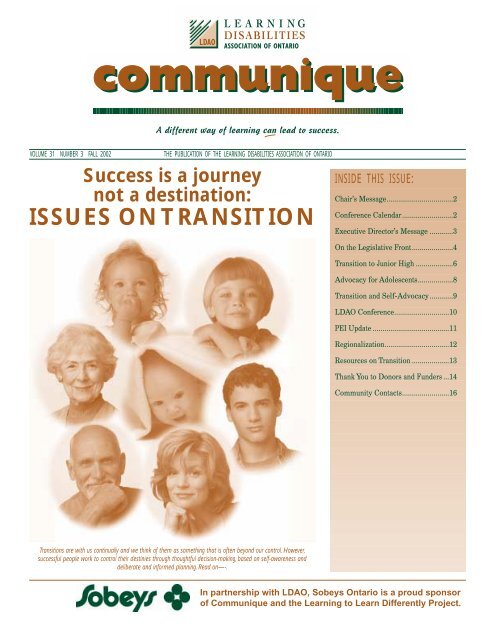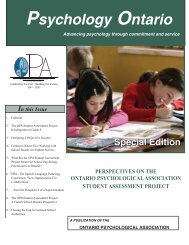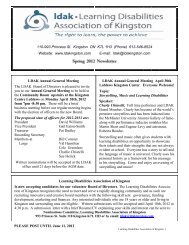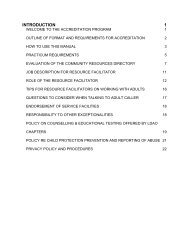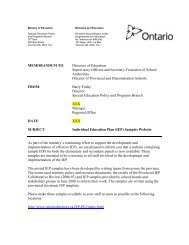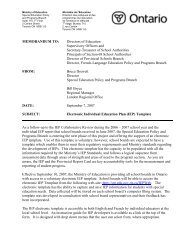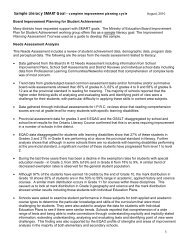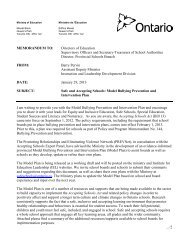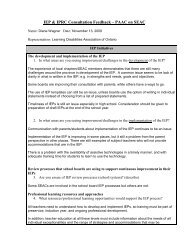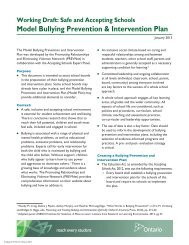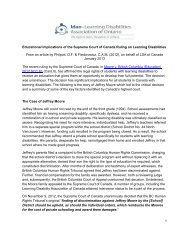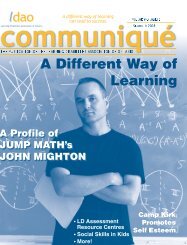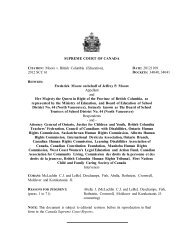LDAO Fall 2002.pdf - Learning Disabilities Association of Ontario
LDAO Fall 2002.pdf - Learning Disabilities Association of Ontario
LDAO Fall 2002.pdf - Learning Disabilities Association of Ontario
Create successful ePaper yourself
Turn your PDF publications into a flip-book with our unique Google optimized e-Paper software.
VOLUME 31 NUMBER 3 FALL 2002 THE PUBLICATION OF THE LEARNING DISABILITIES ASSOCIATION OF ONTARIO<br />
Success is a journey<br />
not a destination:<br />
ISSUES ON TRANSITION<br />
Transitions are with us continually and we think <strong>of</strong> them as something that is <strong>of</strong>ten beyond our control. However,<br />
successful people work to control their destinies through thoughtful decision-making, based on self-awareness and<br />
deliberate and informed planning. Read on—-.<br />
INSIDE THIS ISSUE:<br />
Chair’s Message..................................2<br />
Conference Calendar..........................2<br />
Executive Director’s Message ............3<br />
On the Legislative Front.....................4<br />
Transition to Junior High ...................6<br />
Advocacy for Adolescents..................8<br />
Transition and Self-Advocacy............9<br />
<strong>LDAO</strong> Conference............................10<br />
PEI Update .......................................11<br />
Regionalization.................................12<br />
Resources on Transition ...................13<br />
Thank You to Donors and Funders ...14<br />
Community Contacts........................16<br />
In partnership with <strong>LDAO</strong>, Sobeys <strong>Ontario</strong> is a proud sponsor<br />
<strong>of</strong> Communique and the <strong>Learning</strong> to Learn Differently Project.
Message From The Chairperson<br />
Iam pleased to write my first <strong>of</strong>ficial<br />
message as the new Chairperson <strong>of</strong><br />
<strong>LDAO</strong>. This is a particularly special<br />
honour for me as I am a pr<strong>of</strong>essional in the<br />
field <strong>of</strong> learning disabilities and the<br />
mother <strong>of</strong> an adolescent with a learning<br />
disability. I am also the first Chairperson<br />
<strong>of</strong> <strong>LDAO</strong> as it was agreed as a result <strong>of</strong> our<br />
strategic planning exercise last year, to<br />
Volunteers needed for<br />
Hospital for Sick<br />
Children and Centre for<br />
Addiction and Mental<br />
Health (CAMH) Youth<br />
Education Assessment<br />
and Research Service<br />
(YEARS) Initiative for<br />
Adolescents.<br />
We are looking for teens (ages14-17) to<br />
participate in a study at the Hospital for<br />
Sick Children on reading<br />
comprehension in adolescents with<br />
Attention Deficit Hyperactivity<br />
Disorder (ADHD) and/or Reading<br />
<strong>Disabilities</strong>. We wish to study how<br />
attention and memory impacts on<br />
reading comprehension and how<br />
adolescents vary in their performance<br />
on reading, memory, and language<br />
tasks. All testing is free <strong>of</strong> charge and<br />
families will be reimbursed $20 for<br />
their time. A one-day commitment is<br />
required. Written reports will be<br />
provided. Upon completion <strong>of</strong> the<br />
assessment at Sick Children’s, ADHD<br />
participants will have the option <strong>of</strong><br />
further assessment at CAMH to<br />
explore treatment alternatives and<br />
participate in education sessions and<br />
peer groups. Participants with ADHD<br />
are to contact Ruth Barton, Project<br />
Coordinator, at CAMH 416-535-8501,<br />
ext. 4374; Participants with Reading<br />
<strong>Disabilities</strong> are to contact Karen<br />
Ghelani, at HSC at 416-813-8419.<br />
change the title from President to<br />
Chairperson.<br />
It was good to see many <strong>of</strong> our members at<br />
the recent AGM in Toronto. I want to take<br />
this opportunity to thank all our LDA<br />
volunteers for their continuing support and<br />
dedication to the needs <strong>of</strong> people with LD.<br />
The theme <strong>of</strong> this issue <strong>of</strong> Communique is<br />
Transitions. As we all know change is<br />
<strong>of</strong>ten difficult for people with learning<br />
disabilities. There are three areas <strong>of</strong><br />
transition that can be particularly<br />
overwhelming for people with LD: 1) as<br />
children with LD move from the nurturing<br />
environment <strong>of</strong> elementary school to the<br />
larger secondary school system; 2) moving<br />
on to the somewhat impersonal<br />
postsecondary educational system; and 3)<br />
the move from school to the world <strong>of</strong> work<br />
can be quite devastating. In this issue <strong>of</strong><br />
Communique we present some articles and<br />
suggestions regarding making successful<br />
transitions.<br />
With so many hurdles to overcome, it is<br />
always quite remarkable how many<br />
March 20-22, 2003<br />
Interdependence: a cooperation<br />
towards success<br />
Montreal, P.Q.<br />
LDAQ Annual Conference<br />
Cost: $185-450<br />
Contact: LDAQ<br />
Tel.: (514) 847-1324, ext. 27<br />
congres@aqeta.qc.ca<br />
www.aqeta.qc.ca<br />
April 28-29, 2003<br />
OASAR Annual Conference<br />
<strong>Ontario</strong> <strong>Association</strong> for Students<br />
At Risk<br />
Toronto, <strong>Ontario</strong><br />
For information: (519) 824-4922<br />
www.oasar.org<br />
Isabel Shessel, Chairperson<br />
individuals with learning disabilities<br />
survive the many transitions in their lives.<br />
Remember that success is a journey not a<br />
destination. People with LD <strong>of</strong>ten<br />
experience an extraordinary journey.<br />
I look forward to meeting with many<br />
members over the next two years. I<br />
encourage you to contact me through the<br />
<strong>LDAO</strong> <strong>of</strong>fice with any concerns you may<br />
have. All the best for the coming year.<br />
CONFERENCE CALENDAR<br />
May 4-6, 2003<br />
Destination Success 2003<br />
A National Conference <strong>of</strong> <strong>Learning</strong><br />
<strong>Disabilities</strong> in Post Secondary Education<br />
Georgian College, Barrie, <strong>Ontario</strong><br />
Contact: (877) 722-1523<br />
dnear@georgianc.on.ca<br />
www.destinationsuccess.org<br />
September 25-26, 2003<br />
A different way <strong>of</strong> learning<br />
can lead to success<br />
New workshops with Richard Lavoie<br />
and Larry Silver<br />
Cost: $200-450<br />
Contact: Liz Brillinger, <strong>LDAO</strong><br />
(416) 929-4311, ext. 29<br />
liz@ldao.on.ca<br />
www.ldao.on.ca<br />
FALL 2002, PAGE 2
Message from the<br />
Executive Director<br />
The theme <strong>of</strong> this issue <strong>of</strong> Communique<br />
is transitions. For individuals with<br />
learning disabilities, transition points pose<br />
critical challenges that can determine their<br />
future. Similarly, organizations experience<br />
transitions as they move forward and grow.<br />
As 2002 draws to a close, <strong>LDAO</strong> enters its<br />
40th year <strong>of</strong> existence. In 1963 in Toronto,<br />
a group <strong>of</strong> parents met in someone’s home<br />
and joined forces to advocate with the<br />
school system on behalf <strong>of</strong> their children<br />
who had learning disabilities. Forty years<br />
later, through our chapters and the<br />
provincial <strong>of</strong>fice, we continue to advocate<br />
on an individual and systemic level to<br />
ensure that the needs <strong>of</strong> children, youth<br />
and adults are put forward and are factored<br />
into public policy.<br />
In the past several years, we have had the<br />
opportunity to be proactive in developing<br />
and piloting new approaches to early<br />
intervention that we hope will reduce the<br />
number <strong>of</strong> students entering special<br />
education while assisting the school<br />
system in finding and assisting LD<br />
students more quickly and more<br />
effectively. These recent activities have<br />
been conducted in partnership with school<br />
boards and other key allies and have<br />
recently drawn international attention as<br />
demonstrated by a visit to Toronto by Dr.<br />
Larry Silver, Past President <strong>of</strong> LDA <strong>of</strong><br />
America and Dr. Robert Pasternack. Dr.<br />
Pasternack is Assistant Secretary <strong>of</strong> the US<br />
Department <strong>of</strong> Education responsible for<br />
the Office <strong>of</strong> Special Education and<br />
Rehabilitation.<br />
Their visit reinforced for us that we are on<br />
the right track in the model <strong>of</strong> service that<br />
we are developing and promoting and<br />
proved that <strong>LDAO</strong> is leading the way in<br />
service development. On March 17, 2003<br />
we will be holding a fundraising dinner to<br />
mark our 40th anniversary and to mark<br />
public awareness month. Dr. Pasternack<br />
will return to Toronto to be our keynote<br />
speaker and will share his views <strong>of</strong> the<br />
future <strong>of</strong> education.<br />
Executive Director, Carol Yaworski.<br />
On the advocacy front, we are involved in<br />
a legal matter in Ottawa that is <strong>of</strong> great<br />
importance to exceptional students. <strong>LDAO</strong><br />
has long fought to defend the concept <strong>of</strong><br />
range <strong>of</strong> placements within <strong>Ontario</strong>’s<br />
school system and for school board<br />
compliance with the Education Act. On<br />
August 27, 2002, the Ministry-appointed<br />
supervisor who is now running the Ottawa<br />
Carlton District School Board announced<br />
service cuts amounting to just over $3M,<br />
most <strong>of</strong> them in the area <strong>of</strong> special<br />
education. Included in those cuts was the<br />
loss <strong>of</strong> resource withdrawal programs for<br />
students with learning disabilities.<br />
While the loss <strong>of</strong> those services are <strong>of</strong><br />
great concern to us, our most grave<br />
concern was that hundreds <strong>of</strong> students who<br />
had been through the IPRC process had<br />
their schedules and access to specific<br />
services changed without a new IPRC<br />
being held. <strong>LDAO</strong> has joined a group <strong>of</strong><br />
parents in the Ottawa area in seeking a<br />
judicial review <strong>of</strong> the supervisor’s decision<br />
in the context <strong>of</strong> what we believe to be a<br />
violation <strong>of</strong> the Education Act in not<br />
following the IPRC process set out in the<br />
legislation. The matter will be heard in<br />
Ottawa on November 29, 2002 and we will<br />
post the outcome on our website<br />
www.ldao.on.ca.<br />
Best wishes for the holidays and see you in<br />
2003!<br />
the newsletter <strong>of</strong> <strong>LDAO</strong>, is published three<br />
times yearly, on February 1, June 1 and<br />
October 1. Articles should be submitted to the<br />
Editor, Joan Schiff, approximately 5 weeks<br />
before publication date. Advertising rates are<br />
available upon request. Subscription rate for<br />
non-members is $25.00 yearly.<br />
Communique provides a forum for<br />
information, news and opinions relevant to the<br />
field <strong>of</strong> learning disabilities. The <strong>Association</strong><br />
does not, in any sense, endorse opinions<br />
expressed or methods or programs mentioned.<br />
Articles may be reprinted unless otherwise<br />
stated. Please mention Communique as the<br />
source if and when articles are reprinted.<br />
<strong>LDAO</strong> Board <strong>of</strong> Directors<br />
2002-2003<br />
EXECUTIVE<br />
Chair - Isabel Shessel, Ed.D., Thornhill<br />
Past Chair & Consumer Rep. - Douglas Waxman, LLB.,<br />
Toronto<br />
Vice Chair - Ruth Taber, Barrie<br />
Treasurer-Steve Lee, C.A., Toronto<br />
Member at Large-Peter Chaban, Toronto<br />
Chapter Rep.-Vera Woloshyn, Ph.D.,Grimsby<br />
DIRECTORS<br />
Jerry Baum, Toronto<br />
Jean Carberry, LLB., Toronto<br />
Susan Carlyle, LLB., London<br />
Roy Cooper, Ottawa<br />
Bill Cormier, Kingston<br />
Peter Cuddy, London<br />
John Lubert, Oakville<br />
Lorna Scott, Bruce Mines<br />
Randolph Sealy, Pickering<br />
Tamara Kagan-Kushner, M.D., Toronto<br />
LEGAL COUNSEL<br />
Paul Baston, Fraser Milner Casgrain LLP<br />
STAFF<br />
Executive Director - Carol Yaworski<br />
Manager <strong>of</strong> Membership & Chapter Services - Karen Quinn<br />
Manager-Program & Service Development - Kate Lloyd<br />
Communications & Public Relations - Joan Schiff<br />
Resource & Adult Issues Consultant - Diane Wagner<br />
Chapter Liaison Coordinator - Tim Savage<br />
Office & Technology Coordinator- Richard Massey<br />
Administrative Assistant/Membership Services<br />
- Claudia Marroquin<br />
PEI Project Coordinator - Liz Brillinger<br />
Fund Development Consultant - Denise Harding<br />
Legislation & Government Relations Consultant<br />
- Eva Nichols<br />
Online Services Coordinator - Tamara Bahr<br />
MASTHEAD: By Design<br />
LAYOUT & PRINTING: The Perfect Page<br />
Publications Agreement # 40062755<br />
FALL 2002, PAGE 3
ON THE LEGISLATIVE FRONT<br />
Developing a Practical and Meaningful Transition Plan<br />
for Students with <strong>Learning</strong> <strong>Disabilities</strong><br />
“If you don’t know where you<br />
are going, any road will take you<br />
there.”<br />
This quote from Alice in<br />
Wonderland describes all too well<br />
the experience <strong>of</strong> many students<br />
with learning disabilities when the time<br />
comes for them to go from one educational<br />
setting to another and, in particular, from<br />
secondary school to their post-secondary<br />
destination <strong>of</strong> choice. In spite <strong>of</strong> the fact<br />
that transition planning is a mandated<br />
process for exceptional students who are<br />
14 years <strong>of</strong> age or older and whose<br />
primary identification is any <strong>of</strong> the<br />
exceptionalities other than giftedness,<br />
research indicates that only about 10% <strong>of</strong><br />
the students with learning disabilities have<br />
a practical and meaningful transition plan<br />
included in their Individual Education<br />
Plan. This is not an acceptable level <strong>of</strong><br />
compliance with <strong>Ontario</strong>’s special<br />
education legislation. Furthermore, the<br />
lack <strong>of</strong> adequate transition planning results<br />
in students <strong>of</strong>ten making inappropriate<br />
choices for their future.<br />
Therefore, school boards must be held<br />
more accountable not only for complying<br />
with this requirement set out in Regulation<br />
181/98 and the IEP Standards Document,<br />
but also for ensuring that each student’s<br />
transition plan meets all the necessary<br />
requirements to reflect that student’s<br />
individual strengths, needs, interests and<br />
goals. Students and their parents or<br />
guardians should be able to count on this<br />
commitment.<br />
Transition is usually described as a coordinated<br />
set <strong>of</strong> activities for a student,<br />
designed to promote successful progress to<br />
and from school. Transition relates to entry<br />
into and exit from each educational level,<br />
such as pre-school to elementary school,<br />
elementary school to secondary school as<br />
well as diverse post-school activities,<br />
including post-secondary education, both<br />
university and college, vocational training<br />
including apprenticeships, employment,<br />
adult education, independent living and<br />
community participation.<br />
Successful transition for all students<br />
including those who have learning<br />
disabilities is based on the student’s:<br />
G identified needs<br />
G recognized strengths, skills and<br />
competencies<br />
G interests<br />
G preferences<br />
G short and long term goals<br />
G past experiences, including academic<br />
achievements, co-curricular and<br />
volunteer involvements at school and in<br />
the community.<br />
We know that, in order to be identified as<br />
having a learning disability, students must<br />
demonstrate that they have average to<br />
above average intelligence. Provided that<br />
they have been taught, supported and<br />
accommodated throughout their<br />
educational career appropriately, they<br />
should be able to be successful in the postsecondary<br />
destination <strong>of</strong> their choice.<br />
While intellectually most <strong>of</strong> them can<br />
handle the demands <strong>of</strong> post-secondary<br />
education, they should be encouraged to<br />
make independent choices and be<br />
supported through appropriate transition<br />
planning to achieve their personal goals.<br />
Changes which affect successful transition<br />
from secondary school to post-secondary<br />
settings for students with learning<br />
disabilities are:<br />
G direct teaching and teacher/student<br />
contact decrease significantly<br />
G academic and achievement expectations<br />
increase<br />
G changes in the available personal<br />
support network<br />
G reduced hands-on support role for<br />
parents and others<br />
G greater expectations on the student<br />
to become:<br />
G self-motivated<br />
G resilient<br />
G more independent<br />
G able to manage the many demands<br />
<strong>of</strong> more independent living and/or<br />
living with support in the<br />
community<br />
G self-advocate<br />
G able to cope with disclosure<br />
challenges<br />
G able to apply coping strategies<br />
independently<br />
G able to identify and advocate for<br />
accommodations required<br />
The primary responsibility for facilitating<br />
successful post-school transition for<br />
students with learning disabilities rests<br />
with the school board and in particular<br />
with the student’s school principal.<br />
However, parents and students must<br />
(continued on page 5)<br />
FALL 2002, PAGE 4
On The Legislative Front<br />
cont. from page 4<br />
advocate for and participate in transition<br />
planning throughout the student’s<br />
secondary school years. It should not be<br />
left until Grade 12 to realize that the<br />
student’s future goals cannot be achieved,<br />
because he did not take the right courses or<br />
did not learn to advocate for his<br />
accommodation needs. While all stages <strong>of</strong><br />
transition are important, the transition<br />
made at the end <strong>of</strong> secondary school is<br />
particularly influential in terms <strong>of</strong> the<br />
student’s future success and independence.<br />
School boards need to ensure that their<br />
transition planning process includes all the<br />
necessary learning disabilities-specific<br />
components that will ensure that this large<br />
group <strong>of</strong> exceptional students are<br />
effectively supported in their transition<br />
planning. Essential components <strong>of</strong> an<br />
effective transition plan for a student with<br />
learning disabilities must include:<br />
G Academic preparation plans, including<br />
literacy, metacognitive, problem<br />
solving, communication and future goal<br />
specific skills;<br />
G Personal skills development, including<br />
future independence, life planning,<br />
social skills and self-advocacy skills<br />
development;<br />
G Identifying the student’s<br />
accommodation needs and how these<br />
can best be met at various times and in<br />
diverse locations. This includes learning<br />
to use adaptive and assistive<br />
technology, developing coping<br />
strategies and practising the application<br />
<strong>of</strong> compensatory skills to overcome the<br />
impacts <strong>of</strong> the disability;<br />
G destination-specific preparation.<br />
There are many resources in the<br />
community, ranging from the <strong>Learning</strong><br />
<strong>Disabilities</strong> <strong>Association</strong> <strong>of</strong> <strong>Ontario</strong> and its<br />
chapters to the special needs <strong>of</strong>fices <strong>of</strong><br />
community colleges and universities to the<br />
disability specific and employee assistance<br />
programs <strong>of</strong> many companies and<br />
businesses. Many <strong>of</strong> these would be<br />
excellent partners in the school board’s<br />
transition planning and support programs<br />
and services. School boards and their<br />
personnel need to build upon, encourage<br />
and welcome such community<br />
involvement initiatives.<br />
Post-secondary success, whether in an<br />
educational setting or in employment, is<br />
eminently possible for all students with<br />
learning disabilities. It is imperative that<br />
school boards make the necessary<br />
commitment <strong>of</strong> resources, including<br />
personnel and funding, to manage the<br />
transition process effectively and<br />
successfully for all <strong>of</strong> their exceptional<br />
students. They must also establish an<br />
environment that is student centred. For<br />
students with learning disabilities that will<br />
mean a recognition that these students are<br />
able to achieve to their potential provided<br />
that they receive the necessary help,<br />
guidance, support and accommodation.<br />
The focus needs to be on their abilities and<br />
competencies ahead <strong>of</strong> the barriers<br />
represented by the learning disability.<br />
Since students with learning disabilities<br />
differ from one another, their transition<br />
plans must be individualized and should<br />
not be simply generated by a computer or<br />
based on a generic template. There is no<br />
single suitable postsecondary destination<br />
for students with learning disabilities.<br />
Similarly, there is no single suitable career<br />
choice for students with learning<br />
disabilities. They need to be supported in<br />
setting their own goals and achieving<br />
them.<br />
It is a cliche that every journey begins with<br />
the right first step. Transition planning is<br />
the key first step on the journey <strong>of</strong> postschool<br />
life for students with learning<br />
disabilities. We must support them in<br />
taking it.<br />
Eva Nichols, Legislation and<br />
Government Liaison Consultant<br />
FALL 2002, PAGE 5
<strong>Learning</strong> to Walk Again:The Transition to Junior High<br />
You and your child are about to take<br />
on a scary new challenge: Junior<br />
High. It’s exciting, scary and you feel a<br />
little bit <strong>of</strong> remorse as they take another<br />
step toward independence. However, right<br />
now they still need you and, going into<br />
grade seven, they may need you more than<br />
ever.<br />
Think <strong>of</strong> your child’s transition to junior<br />
high as if your child was learning to walk<br />
again. What did you do? If they are<br />
walking you let them go; even if they<br />
wobble and need some encouragement<br />
you let them do it themselves. If they<br />
fall you don’t run to help them up;<br />
you let them try to get up<br />
themselves. You might give them<br />
instructions, but they can do it<br />
themselves. If they fall and<br />
cannot get up and then start<br />
crying (or in this case asking<br />
for help), you go and help<br />
them up. When they are back<br />
on their feet, you then step<br />
back and be supportive from<br />
behind the scenes.<br />
Grade seven will probably be the<br />
toughest year your child will have<br />
to experience, with a new school,<br />
new teachers, new classmates, on top<br />
<strong>of</strong> a whole new system <strong>of</strong> doing things.<br />
They are suddenly required to move from<br />
class to class and they must have the<br />
proper books for those classes. They must<br />
keep track <strong>of</strong> assignments, projects and the<br />
dates they are due. They have to sign up<br />
for their clubs and classes and any other<br />
extra curricular activities, and then, to top<br />
it <strong>of</strong>f, they have to remember when and<br />
where to go for all these things. In my<br />
child’s school they even have to sign up<br />
their parents for parent-teacher interviews<br />
and then relay this information correctly to<br />
their parents. Often the information<br />
doesn’t make it home. If you are<br />
concerned, imagine how your child is<br />
feeling!<br />
Communication with your child is one <strong>of</strong><br />
the most important factors when helping<br />
them through this transition. Be aware <strong>of</strong> a<br />
change in behaviour, social activities, sleep<br />
or eating patterns. All these can be affected<br />
if your child is feeling stressed and is<br />
having trouble dealing with the stress. It is<br />
important to talk to your child and find out<br />
exactly what he/she is most concerned<br />
about with regard to the move to junior<br />
high. Talk about what role your child wants<br />
you to play in dealing with some <strong>of</strong> their<br />
concerns. Sometimes talking is enough. If<br />
it isn’t, here are some hints that other<br />
parents and I have found very helpful.<br />
1. A tour before the school actually<br />
opens:<br />
Introducing them to their new teacher and<br />
the physical aspects <strong>of</strong> the school can<br />
alleviate a lot <strong>of</strong> stress. Arrange this with<br />
the guidance counsellor. This is the perfect<br />
time for you and the counsellor to sit and<br />
talk with your child about their possible<br />
concerns. Be prepared to drive your child<br />
to school (it is not cool to walk your child<br />
to school now) or set up a buddy system<br />
with one <strong>of</strong> their friends who lives close<br />
by. This may help your child feel less alone<br />
in the big world. A “cool” new outfit or the<br />
latest footwear always helps a child feel<br />
they fit in more.<br />
2. Organization will become a<br />
big factor in your child’s<br />
success:<br />
If your child has never used an<br />
agenda book they will probably be<br />
introduced to them in grade<br />
seven. Our school provides<br />
them. If your school doesn’t use<br />
them, it might be something<br />
that you can introduce to help<br />
with your child’s organization.<br />
The summer before grade<br />
seven, get them an inexpensive<br />
daytimer (weekly) and have<br />
them record their social events<br />
as well as their chores or visits<br />
etc. This will give them a little bit<br />
<strong>of</strong> a head start in time management<br />
for the upcoming school year.<br />
If your school is equipped with e-mail<br />
for individual teachers, this is a perfect<br />
way to find out how your child is coping<br />
and it takes very little time. If your child is<br />
having trouble keeping up, ask the school<br />
to provide weekly reports filled out by<br />
each teacher and sent home to inform you<br />
if the child is completing their assignments<br />
or how things are going in the class.<br />
3. Many children with LD and ADHD<br />
struggle socially and may<br />
develop self-esteem problems:<br />
To help with this problem I found a social<br />
skills group for my child. This group<br />
consisted <strong>of</strong> other children like him who<br />
had similar problems. This was very useful<br />
(continued on page 7)<br />
FALL 2002, PAGE 6
<strong>Learning</strong> to Walk Again<br />
cont. from page 6<br />
and gave my child the coping techniques<br />
that he needed. It also made him realize his<br />
mother was telling the truth and he was not<br />
the only one going through these struggles.<br />
4. OK so now you have your child<br />
ready. Is the school ready?<br />
I ask this because I realized that the school<br />
was not prepared for my child. The school<br />
should have a comprehensive history <strong>of</strong> the<br />
child. To ensure they have this and that<br />
they understand it, set up a meeting with<br />
the school guidance counsellor, the<br />
principal, resource teacher and homeroom<br />
teacher. Give them an overview <strong>of</strong> your<br />
child: his/her personality, strengths and<br />
weaknesses. Be very honest with yourself<br />
and the school. The overview should<br />
include a short academic history to date,<br />
— —<br />
Grade seven will probably be the<br />
toughest year your child will have to<br />
experience, with a new school, new<br />
teachers, new classmates, on top <strong>of</strong> a<br />
whole new system <strong>of</strong> doing things.<br />
— —<br />
positive and negative aspects, any fears<br />
your child may have, and provide<br />
information on the ways others may push<br />
your child’s buttons.<br />
This not only helps your child but it helps<br />
the school. They can then make<br />
arrangements to ensure that your child has<br />
a friend in their homeroom. They can alert<br />
other teachers to be vigilant about certain<br />
situations such as bullying. They should let<br />
you know what their plan <strong>of</strong> action will be<br />
and what other resources may be available<br />
to you and your child. Remember, when<br />
meeting with the school, always approach<br />
them in a positive way and try to be<br />
prepared with some reasonable solutions<br />
<strong>of</strong> your own. The school’s understanding <strong>of</strong><br />
my child seemed to be one <strong>of</strong> the most<br />
important things that helped him move<br />
forward and feel successful.<br />
5. Keep in touch with the teachers:<br />
Pick one that you feel comfortable with<br />
and who can communicate with the other<br />
staff. I always look for a “mothering” type<br />
<strong>of</strong> person in the school and connect my<br />
child with that person, for the times when<br />
he feels stressed, has forgotten his<br />
medication or needs a place to take time<br />
out to talk to someone. A s<strong>of</strong>t heart and a<br />
warm smile on a bad day are good for<br />
everyone. The resource or guidance<br />
teachers are usually good choices as they<br />
understand that learning disabilities and<br />
ADHD do not have to interfere with your<br />
child’s learning.<br />
6. Don’t be intimidated by<br />
meetings with the school:<br />
Think <strong>of</strong> yourself as the expert on your<br />
child. If you are not comfortable in this<br />
role, have your child’s psychologist,<br />
paediatrician or psychiatrist attend the<br />
meeting if possible. They certainly<br />
understand the impact that school has on<br />
your child.<br />
7. Find a dedicated teacher who<br />
believes that each child has<br />
talent and is very important:<br />
Don’t be afraid to ask for a certain teacher<br />
for your child as this person plays a large<br />
role in how that child will do in this school<br />
year. Find such a teacher by talking to<br />
other parents in your area. This was an<br />
important factor in the success <strong>of</strong> my<br />
child’s transition to junior high.<br />
8. The other thing to remember is<br />
that children need a balance<br />
between school and home:<br />
Children should have time to relax as well<br />
as do homework.<br />
I have suggested all <strong>of</strong> this from my own<br />
experience with what works and doesn’t<br />
work with my children. I have spent hours<br />
doing research, attending information<br />
meetings, talking to the <strong>Learning</strong><br />
<strong>Disabilities</strong> <strong>Association</strong> and looking into<br />
my children’s schooling options. The<br />
transition to junior high is a big leap for<br />
most students. For the child with LD and<br />
ADHD, it may be an even larger leap.<br />
Nevertheless, knowing your child and<br />
keeping the pr<strong>of</strong>essionals informed will<br />
benefit him/her in the long term, and<br />
keeping a positive attitude will benefit<br />
everyone.<br />
By Andrea Roy. This article<br />
appeared in NewsLines, the<br />
newsletter <strong>of</strong> LDA <strong>of</strong> Manitoba,<br />
Volume 7 Issue 2 May 1998. Used<br />
with permission.<br />
Genetics and<br />
Reading <strong>Disabilities</strong>:<br />
Research Study<br />
Hospital for Sick Children is seeking<br />
families with a child between 6 and 16<br />
who has a problem with reading. Since<br />
reading disabilities <strong>of</strong>ten run in<br />
families, there is a chance that other<br />
family members will have reading<br />
disabilities as well. Researchers in the<br />
study think that reading disabilities are<br />
caused by changes in genes. They hope<br />
that if they are able to isolate the genes<br />
that make people develop reading<br />
disabilities, they may be able to<br />
eventually better treat reading<br />
disabilities.<br />
Time commitment will be a one-day<br />
meeting with researchers during which<br />
you will be interviewed and your child<br />
will be tested and a blood sample<br />
taken. A written report will be sent to<br />
you that can be copied to your child’s<br />
school.<br />
For more information: Dr. Barbara<br />
Anderson, (416) 813-8207; e-mail:<br />
Barbara.Anderson@sickkids.ca.<br />
FALL 2002, PAGE 7
Advocacy for Adolescents<br />
Training teens to take on their own troubles<br />
Advocacy <strong>of</strong>ten appears to be a parent’s<br />
job. It seems to fall under the category<br />
<strong>of</strong> protection-protecting one’s young from<br />
harm, from failure. Indeed, for the primary<br />
school youngster, the parent is his or her<br />
most important and passionate advocate.<br />
But once a child reaches junior high or high<br />
school, most parents are automatically<br />
disqualified from advocacy. The fact that<br />
they are parents (and are, therefore,<br />
inherently “uncool” and, quite possibly,<br />
incapable in their teenager’s eyes) is the<br />
element that dismisses them from this role.<br />
Who then becomes a youngster’s<br />
champion? The youngster her or himself.<br />
The very ones who, in the end, must<br />
understand and accept their disability, and,<br />
who must act proactively to seek solutions<br />
that make a difference. That is why, as<br />
parents and caring pr<strong>of</strong>essionals, one <strong>of</strong> our<br />
most important goals should be to help the<br />
child with ADD and/or <strong>Learning</strong><br />
<strong>Disabilities</strong> develop into an informed and<br />
effective self-advocate.<br />
Student self-advocacy can begin<br />
successfully by grades four/five. Indeed,<br />
many youngsters with ADD and/or LD<br />
possess an incredible verbal fluency and<br />
social sophistication that are invaluable<br />
assets in negotiation. Those words “overly<br />
social” and “gregarious”, which heret<strong>of</strong>ore<br />
have appeared on report cards as negatives,<br />
now can be recognized as strengths and<br />
brought to bear for the student’s own<br />
benefit.<br />
The steps in training youngsters as selfadvocates<br />
are identical to those used in<br />
training their parents.<br />
1. Identify the student’s individual<br />
strengths as a learner.<br />
2. Identify what his or her liabilities are<br />
and how these affect classroom<br />
performance.<br />
3. Identify and request reasonable<br />
accommodations in testing and<br />
instruction.<br />
Students who engage in this advocacy<br />
training must be mature and secure enough<br />
to accept their differences, as well as<br />
believe in and maximize their strengths.<br />
The development <strong>of</strong> a student “Self-<br />
Advocacy Worksheet” must be done<br />
utilizing the student’s own words, words<br />
which he or she will be comfortable usingultimately<br />
by him or her self- in<br />
negotiation. Advocacy worksheets differ in<br />
length and sophistication depending on the<br />
age <strong>of</strong> the child. The single most important<br />
element in successful student selfadvocacy<br />
is that the student can selfexamine,<br />
self-accept and (through support<br />
and practice) become self-sufficient in this<br />
process.<br />
A student who is developing advocacy<br />
skills must learn the concrete preparatory<br />
steps to negotiation:<br />
1. Don’t go up and try to advocate before<br />
or after class.<br />
2. Make an appointment with the teacher.<br />
3. Write the date and time on your<br />
worksheet.<br />
4. Have copies <strong>of</strong> your worksheet for<br />
everyone who will be there.<br />
5. Review your worksheet before your<br />
meeting.<br />
6. Arrive on time.<br />
Attitude check-negotiation NOT<br />
confrontation:<br />
The training <strong>of</strong> a student as a self-advocate<br />
must include role-playing and rehearsal. At<br />
Educational Tutoring and Consulting, we<br />
develop the worksheet as an exercise in<br />
self-realization, self-acceptance and selfempowerment.<br />
We utilize the worksheet as<br />
a guide-a game plan-for the student to<br />
follow in advocacy meetings with his or her<br />
teacher(s). We recommend that the<br />
worksheet be put in the teacher’s mailbox<br />
prior to the first meeting.<br />
The coordinator working with the student<br />
role-plays advocacy sessions prior to<br />
meeting with the teacher and accompanies<br />
the student to the first in-school advocacy<br />
session. She acts as an initiator, the one<br />
who models the first step (that critical step<br />
that so eludes our youngsters): “Mr.<br />
Jamieson, Brett has developed a thoughtful<br />
plan for participating successfully in your<br />
classroom. He would like to present it to<br />
you and work with you in developing some<br />
solutions for him as a student. Brett-”.<br />
Sample Advocacy Worksheet<br />
6th. Grade Student<br />
Strengths:<br />
1. I am good at expressing myself verbally.<br />
2. I am very artistic (with watercolours).<br />
3. I have good computer skills.<br />
<strong>Learning</strong> Differences:<br />
1. Attention Deficit Disorder<br />
2. Language: Phonetic Memory (spelling)<br />
3. Written expression (on demand)<br />
What Happens to Me<br />
in the Classroom:<br />
1. I have a hard time with the organization<br />
and pacing <strong>of</strong> long-term assignments.<br />
2. I cannot screen out environmental<br />
stimuli like outside movement or a<br />
ticking clock.<br />
3. I sometimes have a short fuse, and I<br />
<strong>of</strong>ten react impulsively.<br />
4. I have a difficult time taking notes.<br />
What Would Help Me<br />
in the Classroom:<br />
1. Chunk long-term assignments. Ask for<br />
these “chunks” on a daily/weekly basis.<br />
2. Balance lectures with visual delivery:<br />
charts, timelines, mind maps etc.<br />
3. Give me an outline <strong>of</strong> the lecture in<br />
advance.<br />
4. Give me a reading guide before I start.<br />
5. Let me demonstrate my knowledge.<br />
6. Modify my testing procedures (more<br />
time/oral tests).<br />
7. Allow someone to take notes for me<br />
(using carbonless paper).<br />
By Janice Bleakney and Karen<br />
Wiles, Educational Testing and<br />
Consulting, Mercer Island, WA.<br />
Reprinted with permission from<br />
CHADDER Box, January, 1994.<br />
FALL 2002, PAGE 8
TRANSITION AND SELF-ADVOCACY<br />
What is Self-Advocacy?<br />
Developing self-knowledge is the first step<br />
in self-advocacy skills. <strong>Learning</strong> about one’s<br />
self involves the identification <strong>of</strong> learning<br />
styles, strengths and weaknesses, interests,<br />
and preferences. For students with mild<br />
disabilities, developing an awareness <strong>of</strong> the<br />
accommodations they need will help them<br />
ask for necessary accommodations on a job<br />
and in postsecondary education. Students<br />
can also help identify alternative ways they<br />
can learn. Self-advocacy refers to:<br />
an individual’s ability to effectively<br />
communicate, convey, negotiate or assert<br />
his or her own interests, desires, needs,<br />
and rights. It involves making informed<br />
decisions and taking responsibility for<br />
those decisions. (VanReusen et al., 1994)<br />
HOW CAN WE IMPROVE<br />
SELF-ADVOCACY?<br />
There are many components in developing<br />
self-advocacy skills in young adults who are<br />
engaged in the transition process. Helping<br />
the student to identify future goals or desired<br />
outcomes in transition planning areas is a<br />
good place to begin. Self-awareness (selfknowledge)<br />
is critical for the student in<br />
determining the direction that transition<br />
planning will take.<br />
Many tools and resources are available to<br />
assist transition planning teams in<br />
conducting a student-centred planning<br />
approach. The following sections provide<br />
some strategies to help individuals with<br />
disabilities develop self-advocacy skills.<br />
Promote the Student as a<br />
Self-Advocate<br />
Encourage the student to be active in the IEP<br />
process and other decision-making<br />
situations. Assist the student in compiling<br />
and developing an exit file. This file should<br />
include the last IEP, a transition plan,<br />
documentation <strong>of</strong> disability, recent test<br />
scores and assessment summaries, a list <strong>of</strong><br />
strengths and areas <strong>of</strong> need, a list <strong>of</strong> home or<br />
work accommodations needed, a summary<br />
<strong>of</strong> learning style, letters <strong>of</strong> recommendation,<br />
and the telephone numbers <strong>of</strong> service<br />
providers. This file empowers the student<br />
and encourages self-knowledge. Self-<br />
advocacy issues and lessons will be most<br />
effective if they are integrated daily.<br />
Respond to Students Who Self-<br />
Advocate Appropriately<br />
Listen to the problem and ask the student for<br />
input on possible accommodations or<br />
modifications that he or she may need. Talk<br />
with the student about possible solutions,<br />
discussing the positive and negative sides. A<br />
person who self-advocates should not feel<br />
alone. Good self-advocates know how to ask<br />
questions and get help from other people.<br />
They do not let other people do everything<br />
for them or tell them what to do. Selfadvocates<br />
are assertive. Assertive people tell<br />
others what they want and need, but they do<br />
not demand. They respect the rights and<br />
feelings <strong>of</strong> other people. They talk over their<br />
ideas with other people. They ask questions<br />
for guidance, then make up their own minds<br />
after reviewing the information. They may<br />
have strong feelings, but they try to be<br />
objective when making their decisions.<br />
Identify Strategies for Teaching<br />
Self-Advocacy<br />
Students need opportunities to practice<br />
newly acquired self-advocacy skills.<br />
Teachers may wish to have students role play<br />
various situations, in which they can practice<br />
skills such as the following:<br />
G Setting up a class schedule<br />
G Moving out <strong>of</strong> the home<br />
G Asking for accommodations needed for a<br />
course.<br />
G Meeting with a rehabilitation counsellor<br />
or social service caseworker<br />
G Meeting with a medical provider<br />
G Working with a personal care attendant<br />
G Interviewing for a job<br />
Students apply self-advocacy skills by<br />
calling and requesting information about a<br />
service they need for transition from high<br />
school. Students can prepare to visit an adult<br />
service provider by compiling a list <strong>of</strong><br />
questions to ask and requests for services.<br />
Identify Examples <strong>of</strong> Self-Advocacy<br />
Objectives on an IEP<br />
Following are some examples <strong>of</strong> objectives<br />
for an IEP that would promote development<br />
<strong>of</strong> self-advocacy. Students will:<br />
GBe able to access information from the<br />
support service staff <strong>of</strong> the postsecondary<br />
school in which they have expressed an<br />
interest.<br />
GState the type <strong>of</strong> information necessary to<br />
self-advocate.<br />
GDefine the terms assertive, passive, and<br />
aggressive.<br />
GIdentify assertive, passive, and aggressive<br />
behaviour in written scenarios.<br />
GState examples <strong>of</strong> their own assertive,<br />
passive, and aggressive behaviours.<br />
GRespond assertively in a given situation.<br />
Identify Student Skills Needed for<br />
Self-Advocacy in a Job Interview<br />
Students need specific self-advocacy skills<br />
for job interviews. Here are a few examples:<br />
G Be prepared: Complete an application<br />
and a resume.<br />
G Be alert: Greet interviewer, establish eye<br />
contact, and sit up straight.<br />
G Be an interested listener: Show<br />
enthusiasm.<br />
G Express yourself clearly: Avoid slang and<br />
negative comments.<br />
G Tell about yourself: Describe your<br />
strengths, goals, and past experiences.<br />
G Ask questions: Show interest and energy.<br />
G Describe what you have to <strong>of</strong>fer or the<br />
types <strong>of</strong> work you want to do.<br />
Demonstrate self-confidence and<br />
enthusiasm.<br />
These are just a few examples <strong>of</strong> the<br />
techniques educators and parents can use to<br />
ensure that students have the self-advocacy<br />
skills needed to make the transition from<br />
school to work. It is important that selfadvocacy<br />
be recognized as a critical<br />
component <strong>of</strong> transition if the ultimate goal<br />
<strong>of</strong> transition independence is to be achieved.<br />
WHY IS SELF-ADVOCACY PART<br />
OF TRANSITION?<br />
No one has a greater stake in the outcome <strong>of</strong><br />
transition planning than the student with a<br />
disability. The student should be an active,<br />
participating member <strong>of</strong> the transition team,<br />
(continued on page 11)<br />
FALL 2002, PAGE 9
A different way <strong>of</strong> learning<br />
can lead to success!!!!!<br />
NEW WORKSHOPS<br />
by<br />
RICK LAVOIE AND DR. LARRY SILVER<br />
THURSDAY, SEPTEMBER 25 th , 2003<br />
Social Skills, Self Esteem and Self Advocacy Skills<br />
FRIDAY, SEPTEMBER 26 th , 2003<br />
Treatment and Programming for <strong>Learning</strong> <strong>Disabilities</strong><br />
8:30 am – 5:00 pm<br />
Holiday Inn- Toronto- Don Valley<br />
1100 Eglinton Ave. East, Toronto [Room Rates for those attending the conference $121.00 per night single or<br />
double occupancy, call (416) 446-3700 and ask for the Reservation Department]. Be sure you mention that you<br />
are there for the <strong>Learning</strong> <strong>Disabilities</strong> <strong>Association</strong> <strong>of</strong> <strong>Ontario</strong> Conference<br />
For more information<br />
contact Liz Brillinger @ (416) 929-4311 Ext. 29<br />
or email liz@ldao.on.ca<br />
-----------------------------------------------------------------------------------------------------------------------------<br />
REGISTRATION FORM<br />
Sign up for: Early Bird After June 1/03<br />
❑ Thurs. Sept. 25/03 $200.00 $225.00<br />
❑ Fri. Sept. 26/03 $200.00 $225.00<br />
❑ Both days $400.00 $450.00<br />
❑ PLP Credit Course Additional: $50.00<br />
Method <strong>of</strong> Payment: ❑ Visa ❑ Cheque- Make Payable to <strong>LDAO</strong><br />
Visa Number: ______________________________________________________________ Expiry Date:_______________________________________<br />
Signature: ______________________________________________________________________________________________________________________<br />
Name: _______________________________________________________ Organization:___________________________________________________<br />
Position:_____________________________________________________________ Phone:___________________________________________________<br />
Address:________________________________________________________________________________________________________________________<br />
_________________________________________________________________________________________________________________________________<br />
FALL 2002, PAGE 10
As the <strong>LDAO</strong> moves into the new year<br />
with the Promoting Early<br />
Intervention initiative, we are gearing up to<br />
undertake a second year <strong>of</strong> piloting<br />
selected sites in the 2002-2003 school year.<br />
We have received an unprecedented<br />
amount <strong>of</strong> support and interest in our<br />
initiative from school boards, educators<br />
and parents alike. Currently, over 500<br />
educators in the province are involved in<br />
screening their senior kindergarten<br />
students and following up with the<br />
provision <strong>of</strong> targeted interventions. The<br />
success <strong>of</strong> the Dynamic Screening and<br />
Intervention Model (DSIM) and pilots has<br />
been due to the work and commitment <strong>of</strong><br />
the volunteer members <strong>of</strong> the PEI working<br />
groups and steering committee, the<br />
Adaptive Technology Resource Centre at<br />
the University <strong>of</strong> Toronto, the staff at<br />
<strong>LDAO</strong> and the partnerships that have been<br />
struck with 34 School Boards and<br />
Aboriginal Authorities.<br />
Phase Two Goals<br />
Our goal with Phase Two is to continue<br />
tracking last year’s senior kindergarten<br />
(SK) cohort into Grade 1, while bringing<br />
Transition and Self-Advocacy<br />
cont. from page 9<br />
as well as the focus <strong>of</strong> all activities. For a<br />
young person with a disability, decisionmaking<br />
is complicated by limited choices<br />
and the tendency for others to tell the<br />
individual what to do.<br />
Too <strong>of</strong>ten students are taught that<br />
dependence, passivity, and reliance on<br />
unseen forces will take care <strong>of</strong> them.<br />
Throughout transition planning, students<br />
should be encouraged to express concerns,<br />
preferences, and conclusions about their<br />
options and to give facts and reasons. They<br />
may need to learn how to express their<br />
thoughts in a way that makes others listen<br />
to them and respect their views. In order to<br />
Promoting Early Intervention:<br />
Phase Two<br />
on a second cohort <strong>of</strong> SK students,<br />
resulting in 1000 educators using the Web<br />
Based Teaching Tool (WBTT) and early<br />
intervention model. Through a further year<br />
<strong>of</strong> piloting we hope to be able to answer<br />
the following empirical questions and<br />
determine if:<br />
G The interventions administered in SK<br />
have been effective, instilling the<br />
message that early screening does not<br />
mean lifelong learning problems;<br />
G The changes in the Grade 1 classroom<br />
environment result in students who<br />
previously were not flagged as at risk<br />
for learning failure, being flagged at<br />
this stage;<br />
G Are there any students who did not<br />
attend kindergarten, and are therefore<br />
new to the school in Grade 1, who are at<br />
risk for learning failure;<br />
G The changes made to the model and<br />
WBTT as a result <strong>of</strong> the feedback from<br />
parents and teachers, and our<br />
experience over the last year, resulted in<br />
improved utility;<br />
G SK is the ideal time to screen students<br />
or if Grade 1, with it’s increased<br />
emphasis on academics, and mandatory<br />
learn these skills, students need to practice<br />
them within a supportive environment. The<br />
transition process is a good place to start.<br />
Transition planning should be an ongoing<br />
opportunity for students to learn and<br />
practice responsibility and self-knowledge.<br />
Transition is an ever-changing process, and<br />
students need to be skilful enough to adapt<br />
to the challenge <strong>of</strong> those changes.<br />
ABOUT THE BOOK: Integrating<br />
Transition Planning Into the IEP<br />
Process (Second Edition)<br />
brings you up to date with recent changes<br />
in US law, including IDEA ‘97 and the Carl<br />
Perkins Act <strong>of</strong> 1998. The book explores<br />
ways schools, community service agencies,<br />
private organizations, and families can<br />
attendance, is the better or additional<br />
time to screen.<br />
Teacher Preparation Materials<br />
In addition to the above-mentioned goals,<br />
innovative alternative preparation strategies<br />
and materials sufficient for a provincial<br />
roll out will be developed.<br />
With the addition <strong>of</strong> grade 1 educators to<br />
the pilots, <strong>LDAO</strong> will be responsible for<br />
the development and role out <strong>of</strong> training<br />
materials sufficient to equip classroom<br />
teachers, resource teachers and principals<br />
to implement the DSIM and navigate the<br />
WBTT. Expanding the training material<br />
provides <strong>LDAO</strong> with the opportunity to<br />
develop an alternative training model that<br />
is more cost effective than the original<br />
training for the first pilots, undertaken<br />
between October 3rd and October 12th,<br />
2001. Distance education principles will be<br />
employed and key individuals will be<br />
contracted with to write the material.<br />
Kate Lloyd, Manager, Program<br />
and Service Development<br />
work together to help students make a<br />
smooth transition to adult life. Covers<br />
transition planning, self-advocacy,<br />
assessment, curriculum for transition,<br />
support services, and program evaluation<br />
and follow-up. ISBN 0-86586-3269-6.<br />
Available from the Council for Exceptional<br />
Children at toll-free 1-888-232-7733.<br />
Excerpted from Integrating<br />
Transition Planning Into the IEP<br />
Process, Second Edition<br />
by Lynda L. West, Stephanie Corbey,<br />
Arden Boyer-Stephens, Bonnie<br />
Jones, Robert J. Miller and Mickey<br />
Sarkees-Wircenski. Published by the<br />
Council for Exceptional Children<br />
1999<br />
FALL 2002, PAGE 11
THE LEARNING DISABILITIES ASSOCIATION<br />
REGIONALIZATION PLAN UPDATE<br />
In early 2000, the <strong>Learning</strong> <strong>Disabilities</strong><br />
<strong>Association</strong> <strong>of</strong> <strong>Ontario</strong> (<strong>LDAO</strong>) received a<br />
four year, $230,200 grant from the <strong>Ontario</strong><br />
Trillium Foundation. The aim is to support<br />
the development <strong>of</strong> Regional Centres,<br />
streamline existing chapters and strengthen<br />
the delivery <strong>of</strong> services and supports to<br />
people with learning disabilities across<br />
<strong>Ontario</strong>.<br />
<strong>LDAO</strong> has been in existence in most areas<br />
<strong>of</strong> the province for at least 35 years (2003<br />
sees the celebration <strong>of</strong> the provincial<br />
organization’s 40th Anniversary). Local<br />
groups started in the kitchens and<br />
basements <strong>of</strong> parents concerned that the<br />
community as a whole was not meeting the<br />
educational, health and social needs <strong>of</strong> their<br />
children with learning disabilities. As we<br />
know, <strong>LDAO</strong> has been instrumental in<br />
bringing about many significant changes in<br />
communities across <strong>Ontario</strong> with many <strong>of</strong><br />
them being in special education services.<br />
Times have changed. Today many local<br />
chapters have a paid staff component, are<br />
governed by a volunteer board <strong>of</strong> directors<br />
and run many different support programs<br />
and direct services. The needs <strong>of</strong> our<br />
organization as a whole have grown in leaps<br />
and bounds but its structure hasn’t really<br />
changed in those 35 years. Yet the outside<br />
world on which we depend for financial and<br />
human resources has changed significantly.<br />
School boards have amalgamated and so<br />
have municipalities. Jobs take people across<br />
the province in numbers not seen in the<br />
early days. Funders and volunteers are<br />
looking to make a significant impact on the<br />
organizations to which they give their time<br />
and money. What have not changed are the<br />
needs <strong>of</strong> people with learning disabilities.<br />
Regardless <strong>of</strong> their community, everyone<br />
has the right to expect that their needs will<br />
be met. The best way for this to happen is<br />
that <strong>LDAO</strong> have a strong local presence that<br />
is able to help identify and address those<br />
needs with quality services and supports.<br />
The <strong>LDAO</strong> Chapter Liaison Committee and<br />
<strong>LDAO</strong> staff have spent the past 2 years<br />
reviewing both the successful and not so<br />
successful aspects <strong>of</strong> our existing<br />
organizational structure. <strong>LDAO</strong> believes<br />
that our proposed structure <strong>of</strong> a Regional<br />
Centre Model with high quality support,<br />
programs and service delivery will benefit<br />
LDA’s locally and provincially.<br />
Regional centres would facilitate<br />
communication among local LDAs,<br />
increase their ability to present a unified<br />
message about the nature <strong>of</strong> learning<br />
disabilities, provide quality community<br />
services and supports, and share relevant<br />
resources and programs. The development<br />
<strong>of</strong> Regional Centres would also strengthen<br />
internal structures and systems and stabilize<br />
the relationship between <strong>LDAO</strong> and its<br />
local affiliates. These centres would also<br />
allow for more specialized staffing and<br />
standardized administrative and financial<br />
systems.<br />
We’re Turning 40<br />
Save the Date!<br />
Join us on Monday, March 17, 2003 as we celebrate 40 years <strong>of</strong> support for people with learning disabilities at<br />
the <strong>LDAO</strong> 40th Anniversary Dinner. This special event, to be held at the newly renovated Liberty Grand<br />
ballroom in Toronto, will help raise money for critical research while highlighting the state <strong>of</strong> special education<br />
in <strong>Ontario</strong> and across North America. The event will feature guest speaker Robert Pasternack, PhD, Assistant<br />
Secretary <strong>of</strong> Special Education and Rehabilitative Services at the U.S. Department <strong>of</strong> Education. Watch our<br />
Web site for further details at http://www.ldao.on.ca. For tickets or sponsorship information, please contact<br />
Denise Harding, fund development consultant, at (905) 853-2758.<br />
The establishment <strong>of</strong> Regional Centres<br />
would not however, detract from the ability<br />
<strong>of</strong> LDA’s to develop services, supports and<br />
programs that reflect the unique needs <strong>of</strong><br />
the individual communities that they serve.<br />
Consistent with existing <strong>LDAO</strong> structures,<br />
each Regional Centre would remain<br />
autonomous with respect to daily decisionmaking<br />
and self-governance practices.<br />
Recently, the <strong>LDAO</strong> Board <strong>of</strong> Directors,<br />
acting upon positive input from the chapters<br />
and satellites and from <strong>LDAO</strong> staff and<br />
external stakeholders, adopted the<br />
establishment <strong>of</strong> Regional Centres as part<br />
<strong>of</strong> the 2002 Strategic Plan. Over the coming<br />
year, the <strong>LDAO</strong> will continue to refine its<br />
regional plan, seeking advice and feedback<br />
from various levels <strong>of</strong> the organization. We<br />
look forward to receiving this feedback and<br />
presenting a more detailed overview <strong>of</strong> this<br />
vision in the coming year.<br />
If you have any questions about the <strong>LDAO</strong>’s<br />
vision to develop Regional Centres, please<br />
call Tim Savage at (416) 929-4311 ext. #39<br />
or e-mail to chapter@ldao.on.ca.<br />
Submitted by the <strong>LDAO</strong> Chapter<br />
Liaison Committee<br />
FALL 2002, PAGE 12
Resources on Transition Issues<br />
Transitions to High School for Students with <strong>Learning</strong> <strong>Disabilities</strong> and/or Attention Deficit Disorder,<br />
by Howard Eaton & Leslie Coull, Eaton Coull <strong>Learning</strong> Group, Ltd., Vancouver, BC, 2000. www.eclg.com<br />
This Canadian organization has put together an excellent video and curriculum unit for young people entering high school. The<br />
video features several students interviewed in grade 8 and again two years later. Together with a Discussion Guide, Student Work<br />
Guide and Self-Advocacy Handbook, the video covers topics on understanding LD and ADHD, knowing your strengths, planning for<br />
new challenges in high school, and learning to self-advocate. Teachers will be interested in the curriculum packages, while parents<br />
may want to order the video or the Self-Advocacy Handbook (for students). See below for prices.<br />
Transitions to Postsecondary <strong>Learning</strong> for Students with <strong>Learning</strong> <strong>Disabilities</strong> and/or Attention Deficit Disorder,<br />
by Howard Eaton & Leslie Coull, Eaton Coull <strong>Learning</strong> Group, Ltd., Vancouver, BC, 1998. www.ecgl.com<br />
In this video (with accompanying curriculum unit) postsecondary students talk about their experiences transitioning from high<br />
school to college or university. Similar themes are discussed as in the above high school curriculum, but with emphasis on the<br />
different expectations in a postsecondary environment.<br />
To order either program call: 1-800-933-4063. Curriculum packages cost $210.95, video alone $99. and Self-Advocacy Handbook<br />
$11.95 (plus shipping & handling and GST).<br />
A Family Affair: Preparing Parents and Students with <strong>Learning</strong> <strong>Disabilities</strong> for Postsecondary Education,<br />
by Jane Drover et al, The Meighen Centre at Mount Allison University & LDA <strong>of</strong> Canada, 1998 ($8.00 + S&H + GST). Available<br />
from <strong>LDAO</strong> or LDAC.<br />
This book is divided into sections directed at parents, parents and students together, and students themselves. The parent section<br />
recommends starting planning for postsecondary studies in junior high. There are many good ideas for both parents and students on<br />
how to prepare and on all the areas that need to be considered.<br />
<strong>Learning</strong> a Living: A Guide to Planning your Career and Finding a Job for People with <strong>Learning</strong> <strong>Disabilities</strong>, Attention<br />
Deficit Disorder, and Dyslexia,<br />
by Dale S. Brown, Woodbine House, Bethesda, MD, 2000, ($28.95 +S&H+GST)<br />
Transitioning to the world <strong>of</strong> work is another important process. Ms. Brown has written a very practical book for individuals who are<br />
in high school or postsecondary studies, or who are preparing for a job change. Issues <strong>of</strong> self-esteem, motivation and social skills are<br />
covered, as well as career planning and many “how to’s” for finding and keeping a job. Ms. Brown brings a wealth <strong>of</strong> experience to<br />
this topic, both personally and from her role on the President’s Committee on Employment <strong>of</strong> People with <strong>Disabilities</strong>.<br />
Order from your local bookstore, or call Parentbooks, 1-800-209-9182.<br />
COMING SOON<br />
Some Assembly Required (SOAR) Transition Curriculum for Students Grade 7 to 12<br />
The first three grade levels <strong>of</strong> <strong>LDAO</strong>’s transition curriculum are expected to be available to School Boards in September 2003.<br />
For full description see Communique Vol. 31 No. 2 Summer 2002.<br />
FALL 2002, PAGE 13
Thank You to Our<br />
Donors & Funders<br />
for gifts received from June, 2002 to<br />
October, 2002.<br />
Your support helps <strong>LDAO</strong> provide a level<br />
playing field <strong>of</strong> opportunities and services<br />
for children, youth and adults with<br />
learning disabilities!<br />
Project Funders<br />
Promoting Early Intervention<br />
<strong>Ontario</strong> Ministry <strong>of</strong> Education<br />
<strong>Learning</strong> <strong>Disabilities</strong> & Literacy<br />
<strong>Ontario</strong> Ministry <strong>of</strong> Training, Colleges and<br />
Universities<br />
Human Resources Development Canada<br />
Chapter Development Project<br />
The <strong>Ontario</strong> Trillium Foundation<br />
The President’s Council<br />
The President’s Council was initiated to<br />
recognize an outstanding level <strong>of</strong><br />
commitment through annual contribution<br />
to <strong>LDAO</strong> and the learning disabilities<br />
network.<br />
Allen & Deborah Edward<br />
Carol & Randy Jones<br />
Peter & Mary Elizabeth Kinch<br />
Merle Langbord Levine<br />
Dr. & Mrs. William Mahoney<br />
Robert M. McDerment<br />
Annette Quinn<br />
Robert & Penny Richards<br />
Carol Yaworski<br />
The welcome and invitation is still open!<br />
You will help us and our chapters maintain<br />
our position as the only organization in<br />
<strong>Ontario</strong> providing services to the learning<br />
disabled population. Please contact Denise<br />
Harding, Fund Development Consultant @<br />
(416) 929-4311 ext. 40 or e-mail<br />
mdharding@rogers.com for further<br />
information.<br />
Communique Sponsor<br />
Sobeys <strong>Ontario</strong><br />
<strong>Learning</strong>-to-Learn Differently<br />
Sponsor<br />
Fellowship <strong>of</strong> Man Foundation<br />
Sobeys <strong>Ontario</strong><br />
Virtual Services Partners<br />
Volunteer @ction Online,<br />
Ministry <strong>of</strong> Citizenship<br />
Celestica<br />
The Charles N. Ivey Foundation<br />
The Richard Ivey Foundation<br />
The Alice and Murray Maitland Foundation<br />
George Cedric Metcalf Foundation<br />
The Paul Newman-Newman’s Own Fund <strong>of</strong><br />
the Fairfield County Community<br />
Foundation<br />
SOAR (Some Assembly Required)<br />
Partners<br />
Justin Eves Foundation<br />
Dynamic Mutual Funds Foundation<br />
Four Seasons Hotels<br />
Magna International<br />
<strong>Ontario</strong> Power Generation<br />
RBC Foundation<br />
Sears<br />
Toyota Canada<br />
Leaders $5,000+<br />
Celestica<br />
Liquor Control Board <strong>of</strong> <strong>Ontario</strong><br />
Benefactors $1,000+<br />
Canada Post<br />
CIBC World Markets<br />
John Deere Foundation<br />
Domgroup Head Office<br />
Maritime Life Assurance Company<br />
Proctor & Gamble Inc.<br />
Scotiabank<br />
VOS Food Store Equipment<br />
Patrons $500+<br />
A&A King Foundation<br />
Book Events Company<br />
CIBC World Markets<br />
Sobeys <strong>Ontario</strong><br />
Contributors $100+<br />
Damma Inc.<br />
John English Middle School<br />
National <strong>Association</strong> for Specialty Food<br />
Royal Bank Financial Group Employees<br />
Tyco Electronics Canada Ltd.<br />
United Way <strong>of</strong> Greater Toronto<br />
Volkswagen Canada Inc.<br />
Dr. Lynn Wells<br />
Friends $50+<br />
Clarica Employee Matching Program<br />
Mrs. Gail Keeffe<br />
OPG Employees’ & Pensioners’ Charity<br />
United Way Centraide Ottawa<br />
Lifetime <strong>of</strong> <strong>Learning</strong> Campaign<br />
Donors<br />
Linda Gibson<br />
Joan and Stan Schiff<br />
Linda Vaughan<br />
Commemorative Gifts<br />
<strong>LDAO</strong> appreciates gifts made in honour <strong>of</strong><br />
anyone <strong>of</strong> your choosing. Please consider<br />
a commemorative gift to support the work<br />
<strong>of</strong> <strong>LDAO</strong> and mark birthdays,<br />
anniversaries, memorials, graduations or<br />
any other milestone. Please contact<br />
Denise Harding, Fund Development<br />
Consultant @ (416) 929-4311 ext. 40 or<br />
e-mail mdharding@rogers.com for further<br />
information about Commemorative Gifts<br />
or the Lifetime <strong>of</strong> <strong>Learning</strong> Monthly<br />
Donor Program. Gifts <strong>of</strong> $50+ will be<br />
listed in the subsequent newsletter.<br />
CEO’s 15th.Annual<br />
Golf Tournament<br />
This year’s Consulting Engineers <strong>of</strong><br />
<strong>Ontario</strong> (CEO) golf tournament netted<br />
$13,000 to support the work <strong>of</strong> <strong>LDAO</strong>.<br />
CEO has been a donor since 1987 when<br />
the then CEO President, Bill Weinstein,<br />
(continued on page 15)<br />
FALL 2002, PAGE 14
CEO’s Golf Tournament<br />
cont. from page 14<br />
who was also a member <strong>of</strong> the <strong>LDAO</strong><br />
Board, initiated the donation to <strong>LDAO</strong> <strong>of</strong><br />
the annual CEO golf tournament proceeds.<br />
Bill remains involved with CEO. Thank<br />
you to the new CEO President John<br />
Gamble and his staff for continuing the<br />
tradition.<br />
Listed below are the industry-related<br />
companies who participated in the<br />
tournament and some <strong>of</strong> the many<br />
companies, stores, arts and sport<br />
organizations and government ministries<br />
who contributed to the prize table.<br />
Donors<br />
Aldworth Engineering Inc.<br />
Canadian Consulting Engineer Magazine<br />
Con-Drain Company (1983) Limited<br />
V.B. Cook Co. Limited<br />
DCI and Associates<br />
DPIC Companies<br />
Liberty Engineering<br />
Robert M. Martin Engineering & Project<br />
Management Inc.<br />
Study Seeks<br />
Families<br />
Researchers at the University <strong>of</strong><br />
Toronto and the Hospital for Sick<br />
Children are conducting a study<br />
examining how children with attention<br />
deficit hyperactivity disorder (ADHD)<br />
feel about themselves and their<br />
relationships, as well as how parents<br />
view their children’s behaviour and feel<br />
about parenting. Researchers are<br />
looking for parents and their 9 to 14<br />
–year old children. Both children with<br />
and without ADHD are needed. As part<br />
<strong>of</strong> the study, an educational assessment<br />
and assessment <strong>of</strong> the child’s selfconcept<br />
will be conducted. Parents will<br />
receive an assessment report on their<br />
children and will be compensated for<br />
their expenses. No medical procedures<br />
will be conducted.<br />
For more information, please call<br />
(416) 923-6641, ext. 2450 and leave a<br />
message.<br />
Philips Engineering Ltd.<br />
J.L. Richards & Associates Limited<br />
Swarovski Canada Ltd.<br />
Trow Consulting Engineers Ltd<br />
Woodbridge Foam Corporation.<br />
Hole Sponsors<br />
Acres and Associated Environmental Limited<br />
Acres International Limited<br />
The Ainley Group<br />
AMEC Earth & Environmental Limited<br />
K.J. Beamish Construction<br />
Benefit Partners<br />
R.J. Burnside & Associates Limited<br />
Cansult Limited<br />
CH2M Hill Canada Limited<br />
Concrete Floor Contractors <strong>Association</strong><br />
Con-Drain Company (1983) Limited<br />
Conestoga-Rovers & Associates Limited<br />
Consulting Engineers <strong>of</strong> <strong>Ontario</strong><br />
DPIC Companies<br />
Earth Tech Canada Inc.<br />
ENCON Group Inc.<br />
Giffels Associates Limited<br />
KMK Consultants Limited<br />
MacViro Consultants Ltd.<br />
Marshall Macklin Monaghan Limited<br />
McCormick Rankin Corporation<br />
Morrison Hershfield Limited<br />
<strong>Ontario</strong> Concrete Pipe <strong>Association</strong><br />
<strong>Ontario</strong> Hot Mix Producers <strong>Association</strong><br />
Peto MacCallum Ltd.<br />
Sarafinchin Associates Ltd.<br />
Schaeffer & Associates Ltd.<br />
Smylie & Crow Associates Inc.<br />
SNC-Lavalin Engineers & Constructors Inc.<br />
Stantec Consulting Ltd.<br />
Terraprobe Limited<br />
Totten Sims Hubicki Associates<br />
Trow Consulting Engineers Ltd.<br />
Hole in One Prizes<br />
Hugh Wood Canada Ltd.<br />
Saturn Saab Isuzu on the Queensway<br />
Sinclair Cockburn Financial Group<br />
Closest to the Pin<br />
Air Canada<br />
Barlow Associates Ltd.<br />
ENCON Group Inc.<br />
Yellow Ball Tournament<br />
DPIC Companies<br />
The 2002 Gloria Landis Memorial Bursary was presented to Nancy Augustine by <strong>LDAO</strong> Director Randolph Sealy. Nancy<br />
is a mature student working toward her B.A. in psychology at York University’s Atkinson Faculty.A single mother with four<br />
young children, Nancy was only recently diagnosed with a significant learning disability, and has shown great<br />
determination in pursuing her goals.<br />
FALL 2002, PAGE 15
Your Community Contacts<br />
Chatham-Kent<br />
Contact: Dawn Babkirk<br />
Tel: (519) 352-2024<br />
ldack@netrover.com<br />
City <strong>of</strong> Kawartha Lakes<br />
Satellite (Lindsay)<br />
Contact: Barb Overwijk<br />
Tel: (705) 324-5119<br />
overwijk@sympatico.ca<br />
Durham Region<br />
Contact: Mrs. Marlene Avery<br />
Tel: (905) 509-4182<br />
platers@pathcom.com<br />
Halton County (Oakville-Burlington)<br />
Contact: Heather Holden<br />
Tel: (905) 844-6905<br />
Hamilton-Wentworth<br />
Contact: Tom Parker<br />
Tel: (905) 523-1332<br />
Kingston<br />
Contact: Lana Greenwood<br />
Tel/Fax: (613) 545-0373<br />
ldak@kingston.jkl.net<br />
Kitchener-Waterloo<br />
Contact: Charlotte Buchan<br />
Tel: (519) 743-9091<br />
ldakw@golden.net<br />
www.ldakw.on.ca<br />
Lambton County<br />
Contact: Joanne Cully<br />
Tel: (519) 344-7745<br />
www.sarnia.com/groups/lda-lc<br />
365 Bloor Street East,<br />
Suite 1004, Box 39,<br />
Toronto, <strong>Ontario</strong><br />
M4W 3L4<br />
Tel: (416) 929-4311<br />
Fax: (416) 929-3905<br />
E-mail:<br />
membership@ldao.on.ca<br />
Website:<br />
www.ldao.on.ca<br />
London Region<br />
Contact: Carl Sinclair<br />
Tel: (519) 438-6213<br />
lda@linkd.net<br />
www.ldalr.on.ca<br />
Mississauga<br />
Contact: Terri Hamilton<br />
Tel: (905) 272-4100<br />
ldamiss@idirect.com<br />
Newmarket-Aurora and<br />
District<br />
Contact: Amy Oman<br />
Tel: (905) 853-6542<br />
ldanad@email.com<br />
Niagara Region<br />
Contact: Kay MacDonald<br />
Tel: (905) 641-1021<br />
ldaniag@becon.org<br />
North Bay & District Satellite<br />
Contact: Kathy Honeysett<br />
Tel: (705) 476-8177<br />
kathyhoneysett7@hotmail.com<br />
North Peel (Brampton)<br />
Contact: Susan Silver<br />
Tel: (905) 791-4100<br />
lda@bellnet.ca<br />
www.ldanp-peel.org<br />
Ottawa-Carlton<br />
Contact: Judy Mathew<br />
Tel: (613) 567-5864<br />
ldaoc@magma.ca<br />
www.ncf.ca/ldao-c<br />
Peterborough<br />
Contact: Shari Davis<br />
Tel: (705) 748-9455<br />
Tollfree: (866) 503-3303<br />
ldaptbo@pipcom.com<br />
Cobourg : (905) 373-7033<br />
ldanorthclar@rol.ca<br />
Sault Ste. Marie<br />
Contact: Jessica Bernhardt<br />
Tel: (705) 942-4310<br />
learningdisabilities@shaw.ca<br />
www.members.shaw.ca/ldassm<br />
Simcoe County<br />
Alliston: (705) 435-0376<br />
ld<strong>of</strong>fice@ldass.org<br />
www.ldass.org<br />
Barrie: (705) 726-5553<br />
Local Tollfree: (888) 684-5855<br />
Thunder Bay<br />
Contact: Janis Thompson<br />
Tel: (807) 622-9741<br />
www.ldatbay.ca<br />
Toronto District<br />
Contact: Dena Tenenhouse<br />
Tel: (416) 229-1680<br />
www.ldany.on.ca<br />
admin@ldany.on.ca<br />
Wellington County<br />
(Guelph)<br />
Contact: Margaret Burnett<br />
Tel: (519) 837-2050<br />
Windsor-Essex County<br />
Contact: Beverly Clarke<br />
Tel: (519) 252-7889<br />
learningdisabilities@on.aibn.com<br />
York Region (Richmond Hill)<br />
Contact: Lynn Ziraldo<br />
Tel: (905) 884-7933/471-1620<br />
ldayr@idirect.com<br />
http://webhome.idirect.com/~ldayr/<br />
Postage paid Port payé<br />
Publications Mail Poste-publications<br />
40062755


